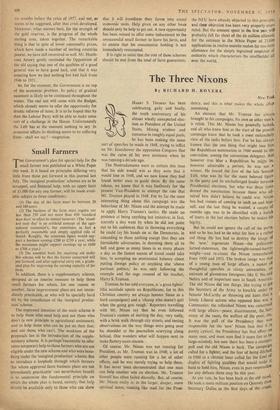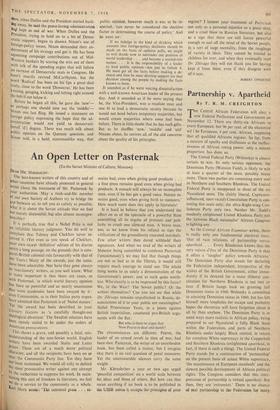The Three Nixons
By RICHARD H. ROVERE The Nostradamuses were as certain this time that his side would win as they were that it would lose in 1948, and we now know they had found better stars to guide them. By the same tokens, we know that it was foolhardy for the present Vice-President to attempt the role that Mr. Truman played in 1948. For by far the most interesting thing about this campaign was the behaviour of Mr. Nixon and the attempt he made to apply Harry Truman's tactics. He made no pretence at being anything but imitative; in fact, scarcely a day went by when he did not point out to his audiences that in throwing everything he could lay his hands on at the Democrats, in conceding to them nothing except that they are formidable adversaries, in damning them all to hell and gone as many times in as many places a day as the fastest means of travel could take him, in accepting no sentimental baloney about putting foreign policy or anything else 'above partisan politics,' he was only following the example and the sage counsel of his teacher, Harry S. Truman.
Truman, he has told everyone, is 'a great fighter' (this accolade upsets no Republicans, for in this Christian country we always honour Satan as a hard campaigner) and a 'champ who doesn't quit when the going gets rough.' Reporters travelling with Mr. Nixon say that he even followed Truman's custom of starting the day, very early, with a brisk walk through city streets, and tossing observations on the way things were going over his shoulder at the journalists scurrying along behind. One wonders what will happen next to make flattery more sincere.
Of course, Mr. Nixon was not running for President, as Mr. Truman was in 1948; a lot of other people were running for a lot of other offices, and he was merely trying to help them. It has never been demonstrated that one man can help another win an election. Mr. Truman himself has often failed dismally. But, of course, Mr. Nixon really is, in the larger, deeper, more spiritual sense, running like mad for the Presi- dency, and this is what makes the whNoll'e"'aYZir interesting.
An element that Mr. Truman has always brought to his campaigns, his own or other men's, is relish. This Mr. Nixon has generally lacked' and all who knew him at the start of the present campaign knew that he took a most melancholy view of the tasks before him. For he has alwaYs known that the one thing that might lose him the Republican nomination in 1960 would be the conviction, among the convention delegates, that however true blue a Republican he might be, however admirable a person, he was not a winner. He feared the fate of the late Senator Taft, who was by far the most beloved figure in the party and its unchallenged leader between Presidential elections, but who was three times denied the nomination because those who ad- mired him didn't believe he could win. Nixon has had visions of coming to such an end hitn" self, and the .last thing he wanted, a couple Of months ago, was to be identified with a bunch of losers in the last election before he makes his big try.
But he could not ignore the call of the party, and so he has had to do what for him is a rather sad thing. He has had to destroy the image of the 'new,' regenerate Nixon—the politician- turned-statesman, the lightweight-turned-heavY. weight—and re-create the Nixon remembered from 1950 and 1952. The broken image was that of a young man of large affairs, a maker of thoughtful speeches at classy universities, an intimate of glamorous foreigners like U Nu and Nehru and of important men in South America. The old Nixon did low things, like trying to gel the Secretary of the Army to knuckle under to Senator McCarthy or throwing out hints that 3 lovely Liberal actress who opposed him Was 3 Communist; the refinished Nixon was concerned with large affairs—peace, disarmament, the hat mony of the races, the welfare of the poor, etc' It was the pull of the Presidency that Was responsible for the 'new' Nixon (not that it is purely cynical; the Presidency has that effect on many men, and most men find it more fun to be large-minded), but now there has been a counter' pull and the old Nixon is back. The campaign called for a fighter, and the fear of being ditched in 1960 as a chronic loser called for the kind e.f display of lighting qualities that would make a hard to hold him, Nixon, even in part responsible for any defeats there may be this year. At any rate, he has been back at the old stand He took a more militant position on Quern0N than Secretary Dulles in the first days„ of the crisis;- then, when Dulles and the President started back- ing away, he said the peace-loving administration haft kept us out of war. When Dulles and the President, trying to hold• on to a bit of Demo- cratic support, began to disown Nixon's use of foreign-policy issues, Nixon demanded their en- dorsement of his strategy and got it. He has been squeezing campaign contributions out of Mid- Western bankers by scaring the wits out of them with talk of the spending orgies that will follow an increase of Democratic seats in Congress. He hasn't exactly revived McCarthyism, but the word 'Radical'. has been on his lips a great deal lately, close to the word 'Democrat.' He has been kneeing, gouging, kicking and hitting right around the belt if not below it.
Before he began all this, he gave the 'new'— or perhaps one should now say the `middle'— Nixon one last fling. He issued a statement on foreign policy expressing the hope that the ad- ministration would not yield to democratic (small 'd') dogma. There was much talk about public opinion on the Quemoy question, and Nixon said, in a bold, statesmanlike way, that public opinion, however much it was to be re- spected, 'can never be considered the decisive factor in determining the course of policy.' And he went on :
If we indulge in the kind of thinking which assumes that foreign-policy decisions should be made on the basis of opinion polls, we might as well decide now to surrender our position of world leadership . . . and become a second-rate nation. . . . It Is the responsibility of a leader to lead public opinion—not just to follow it. He must get all the facts before making a de- cision and then he must develop support for that decision among the people by making the facts known to them.
It soundecLas if he were voicing dissatisfaction with a well-known American leader of the present day. And it sounded as if he were saying that he, the Vice-President, was a' resolute man and one fit to lead a democratic society because he would not bend before temporary majorities, but would create majorities where none had been before. There is little doubt that he has such gifts. But as he shuffles 'new,' middle' and 'old' Nixons about, he revives all of the old concerns about the quality of his principles.



































 Previous page
Previous page